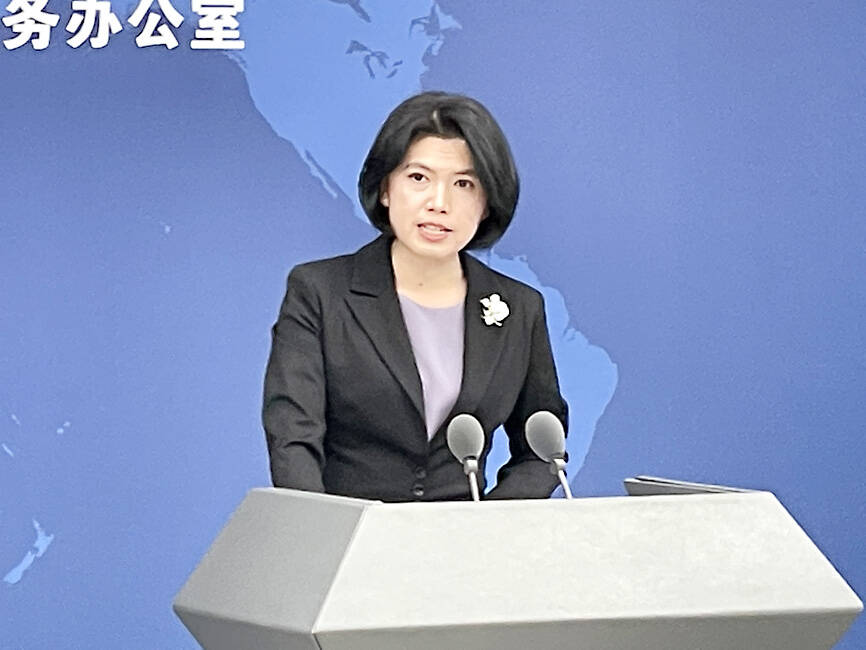Taiwanese writer Liao Meng-yen (廖孟彥) has been arrested in China for producing obscene content, China’s Taiwan Affairs Office (TAO) said yesterday, but did not comment on what sentence had been handed down.
The Taipei-based Straits Exchange Foundation (SEF) on Tuesday said that the writer, known as Roson (羅森), had not contacted his family for more than a year.
The family last week asked for assistance from the foundation, which promised to contact the Beijing-based Association for Relations Across the Taiwan Straits regarding the case, the SEF said.

Photo: CNA
The SEF did not release further details in accordance with his family’s wishes.
On Dec. 1, a post on Professional Technology Temple (PTT) said that Liao had been sentenced to 12 years in prison, citing a message from a Chinese reader on Nov. 30.
On Feb. 7, Xinhua news agency reported that Chinese police had arrested a man surnamed Liao for “propagating obscene messages in the guise of fantasy novels.”
At a regular news conference in Beijing yesterday, TAO spokeswoman Zhu Fenglian (朱鳳蓮) confirmed that “relevant departments” were handing the case in response to a question from Taiwanese reporters.
Liao is suspected of “producing, selling or disseminating obscene articles for profit” and the case is being handled according to the law, Zhu said in China’s first public comments on the matter.
Liao, who has lived in China’s Guangdong Province for many years, is known for writing erotica and wuxia (武俠, martial arts) fantasy stories.
The writer’s China-based Web site has been inaccessible since September last year and the most recent post on his Sina Weibo account was in November last year.
In China, standards governing speech and publishing are fluid, Cross-Strait Policy Association researcher Wu Se-chih (吳瑟致) said yesterday, warning that areas with more ambiguity are subject to legal intervention.
The word of Chinese authorities is law, making it difficult to identify where the boundaries are, Wu said.
Chinese authorities have in the past few years been cracking down on the arts and entertainmentsector, especially online and digital media, he added.
China has over the past few years opened to more Taiwanese writers and publishers, while at the same time failing to define standards, he said.
Taiwanese writers also have a vastly different understanding of freedom of speech and publishing than the Chinese government, he said.
Content deemed to be political, harmful to the image of the country or its leaders, or detrimental to “Chinese rejuvenation” is subject to censorship, Wu said, adding that creative industries should not move to China.
Additional reporting by Chen Yu-fu

Alain Robert, known as the "French Spider-Man," praised Alex Honnold as exceptionally well-prepared after the US climber completed a free solo ascent of Taipei 101 yesterday. Robert said Honnold's ascent of the 508m-tall skyscraper in just more than one-and-a-half hours without using safety ropes or equipment was a remarkable achievement. "This is my life," he said in an interview conducted in French, adding that he liked the feeling of being "on the edge of danger." The 63-year-old Frenchman climbed Taipei 101 using ropes in December 2004, taking about four hours to reach the top. On a one-to-10 scale of difficulty, Robert said Taipei 101

Nipah virus infection is to be officially listed as a category 5 notifiable infectious disease in Taiwan in March, while clinical treatment guidelines are being formulated, the Centers for Disease Control (CDC) said yesterday. With Nipah infections being reported in other countries and considering its relatively high fatality rate, the centers on Jan. 16 announced that it would be listed as a notifiable infectious disease to bolster the nation’s systematic early warning system and increase public awareness, the CDC said. Bangladesh reported four fatal cases last year in separate districts, with three linked to raw date palm sap consumption, CDC Epidemic Intelligence

US climber Alex Honnold left Taiwan this morning a day after completing a free-solo ascent of Taipei 101, a feat that drew cheers from onlookers and gained widespread international attention. Honnold yesterday scaled the 101-story skyscraper without a rope or safety harness. The climb — the highest urban free-solo ascent ever attempted — took just more than 90 minutes and was streamed live on Netflix. It was covered by major international news outlets including CNN, the New York Times, the Guardian and the Wall Street Journal. As Honnold prepared to leave Taiwan today, he attracted a crowd when he and his wife, Sanni,

Taiwanese and US defense groups are collaborating to introduce deployable, semi-autonomous manufacturing systems for drones and components in a boost to the nation’s supply chain resilience. Taiwan’s G-Tech Optroelectronics Corp subsidiary GTOC and the US’ Aerkomm Inc on Friday announced an agreement with fellow US-based Firestorm Lab to adopt the latter’s xCell, a technology featuring 3D printers fitted in 6.1m container units. The systems enable aerial platforms and parts to be produced in high volumes from dispersed nodes capable of rapid redeployment, to minimize the risk of enemy strikes and to meet field requirements, they said. Firestorm chief technology officer Ian Muceus said